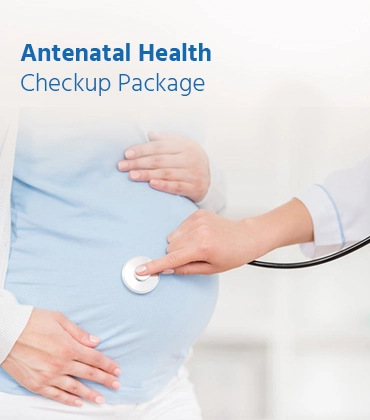Frequently Asked Questions
1. What tests are done during an antenatal check up?
The tests for an Antenatal Health Checkup are:
2. What is an antenatal check up?
Antenatal checkup is routine health screening of presumed healthy pregnant women without symptoms in order to diagnose diseases or complicating obstetric conditions without symptoms, and also to provide information about pregnancy and delivery.
3. How often should you get your Antenatal Checkup done?
Depending on the pregnant woman's condition, your gynec recommends you to get checked monthly once or twice.
4. What is a CUE (complete urine examination)?
A complete urine examination helps in detecting such abnormal constituents in urine. Several disorders can be detected by identifying and measuring the levels of such substances. It may be used to screen for and/or help diagnose conditions such as urinary tract infections, kidney disorders, liver problems, diabetes, or other metabolic conditions.
5. Why is the serum creatinine test done?
The creatinine clearance test examines the quantity of creatinine in your urine and blood to determine how well your kidneys are working. Creatinine is a waste product that your kidneys normally filter out of your blood. Creatinine levels that are abnormal might indicate renal failure.
6. What is TSH (thyroid-stimulating hormone)?
Thyroid-stimulating hormone (TSH) is a pituitary hormone that stimulates the thyroid gland to create thyroxine (T4) and later triiodothyronine (T3), which increases the metabolism of nearly every tissue in the body.
7. Why random blood sugar test is done?
Blood glucose tests done at various intervals can help you detect hyperglycemia and minimize the chance of developing chronic problems. Testing the blood glucose levels at different times throughout the day can assist you in managing your diabetes and lowering the risk of complications
8. What is a platelet count?
Platelets, also known as thrombocytes, are small cell fragments that are required for proper blood coagulation. They are produced in the bone marrow from very big cells called megakaryocytes and then discharged into the bloodstream to circulate. The platelet count is a test that detects how many platelets are present in a blood sample.
9. What do you mean by Rh blood grouping?
Rhesus (Rh) factor is an inherited protein found on the surface of red blood cells. If your blood has the protein, you're Rh-positive. If your blood lacks the protein, you're Rh-negative. Rh-positive is the most common blood type. Possible ABO blood groups include O, A, B, or AB.
10. What are Haemoglobin and its function?
About 70 percent of your body's iron is found in the red blood cells of your blood called hemoglobin and in muscle cells called myoglobin. Hemoglobin is essential for transferring oxygen in your blood from the lungs to the tissues.
